CREATE ME2 Past Events
|
CREATE ME2 5th Annual Conference May 16, 2024 The 5th CREATE ME2 annual conference took place in Calgary with 65 attendees. The one day conference included 4 sessions of oral presentation covering the CREATE ME2 technical themes: redox flow batteries, solid state batteries, low-temperature fuel cells, and fuel synthesis / CO2 conversion. There were invited keynote speakers for each theme: Dr. Kiana Amini (UBC), Dr. Milana Trifkovic (University of Calgary, CREATE ME2 Co-PI), Dr. Jason Lee (University of Victoria), and Dr. Mayank Sabharwal (University of Calgary, CREATE ME2 alumni). The program also included presentations from selected CREATE ME2 trainees, and a poster session. Award winners from the poster competition were as follows: 1st prize: Mohamad Gabdan Three-dimensional microscale modeling of NMC cathodes using FIB-SEM tomography with multiple resolutions Runner-up prize (joint): Fatemeh Mousavizadeh Electrocatalytic CO2 Reduction Utilizing Novel Nitrogen and Sulfur-Doped Colloid-Imprinted Carbons Runner-up prize (joint): Sara Bouzidi Elucidating the Benefits of Nanoparticle Exsolution in Transition Metal Doped and Undoped La0.3Ca0.7Fe0.7Cr0.3O3-δ Perovskites in Solid Oxide Cells for CO2-CO Conversion. |
|
|
NSERC CREATE ME2 Materials for Electrochemical Energy Solutions Water Electrolysers Bottlenecks, Advantages, and Outlook April 4th , 2023 14:45 PM – 16:00 PM (MDT) The CREATE ME2 Team is pleased to invite you to attend a guest speaker (Dr. Bruno G. POLLET) workshop. Abstract: Climate change is one of the greatest challenges facing the world today and energy systems need to meet the commitments made at the 2015 Paris Agreement. Many countries have implemented decarbonisation strategies for significantly reducing greenhouse gases (GHG) and CO2 emissions. It is now widely accepted that hydrogen will be required as part of the decarbonised energy systems, and there is significant momentum building in the renewable and low-carbon hydrogen energy sector around the world. In the case of “green hydrogen” (GH2), it is a hydrogen produced through the electrolysis of water in an electrolyser, powered by renewable electricity, the so-called “green electron”, e.g., wind, solar, hydro, thermal, etc (<0.1% of the global hydrogen production vs. 99% from fossil fuels). Some recent market reports indicate that between 400-550million tonnes of hydrogen will be produced by electrolysis, requiring 3,000-4,000GW of electrolysers (ca. 3,000-4,000 times increase in electrolyser capacity by 2050). Although the cost of GH2 is falling largely due to falling renewable power costs, GH2 is still 2-3 times more expensive than “blue hydrogen” (produced from reformed fossil fuels with carbon capture and storage, CCS) and further cost reductions are needed. Water Electrolyser (WE) technologies strongly depend upon the materials used i.e., catalysts, electrolytes, separators, electrodes, porous transport layers/gas diffusion layers, working temperatures and pressures. Currently, there are five main types of WE, namely: (i) Proton Exchange Membrane Water Electrolyser (PEMWE), (ii) Alkaline Water Electrolyser (AWE), (iii) Anion Exchange Membrane Water Electrolyser (AEMWE) (iv) Solid Oxide Electrolysis Cell (SOEC) and (v) Proton Conducting Ceramic Electrolyser (PCCEL). For all WE, further R&D in materials and systems (e.g., BoP- balance of plant) is required to drastically improve performance and durability as well as reducing costs [1,2]. This presentation will highlight the state-of-the-art, benefits, bottlenecks (e.g., critical raw materials, membranes, degradation, costs, etc), strategies for cost reduction (materials, stack, and system levels), potential routes for overcoming the major issues, and future key performance indicators (KPIs) and targets for all low-temperature water electrolyser technologies. References: [1] Chatenet, M.; Pollet, B.G.; et al., Water Electrolysis: From textbook knowledge to the latest scientific strategies and industrial developments. Chem. Soc. Rev. 2022, 51, 4583-4762. DOI https://doi.org/10.1039/D0CS01079K (Open Access); [2] Hydrogen and Fuel Cells Primers books
Biography: Bruno G. Pollet has worked on Hydrogen Energy in the UK, Japan, South Africa, Norway, and Canada. He is a Fellow of the UK Royal Society of Chemistry, and Professor of Chemistry at the University of Quebec at Trois-Rivières (UQTR) in Canada. He is a member of the Council of Engineers for the Energy Transition: An Independent Advisory Council to the United Nations’ Secretary-General. He holds the Canada Research Chair and Industrial Research Chair in Green and Renewable Hydrogen Production with a strong focus on the next generation of electrolysers. He is Director of the UQTR Institute for Hydrogen Research (IHR), Director of the Green Hydrogen Laboratory (GH2Lab), Adjunct Professor of Renewable Energy at the Department of Energy & Process Engineering (DEPE), Norwegian University of Science and Technology (NTNU), Adjunct Professor at the Hydrogen Safety Engineering Research (HySAFER), Ulster University (UK) and President of the Green Hydrogen Division of the International Association for Hydrogen Energy (IAHE). He is an active member of Hydrogen Europe Research. In 2022, the hydrogen community awarded him with the "IAHE Sir William Grove Award" for his work in hydrogen, fuel cell and electrolyser technologies. He is member of the Board of Directors of the Canadian Hydrogen and Fuel Cell Association (CHFCA). He is also leading H2CAN 2.0, a cluster of H2FC R&D groups in Canada (www.h2can.org). His research covers a wide range of areas from the development of novel materials for low-temperature fuel cells and water electrolysers, hydrogen production from pure, waste, & saline waters, as well as oxygenated solutions and CO -saturated waters to fuel cell and electrolyser systems, demonstrators, & prototypes. His research also focuses on sonoelectrochemistry to produce fuel cell/electrolyser materials and to improve electrochemical processes. He co-founded & co-directed the Birmingham Centre for Hydrogen and Fuel Cell (H2FC) Research (UK) and was Director of Hydrogen South Africa (HySA) Systems Integration & Technology Validation Competence Centre (South Africa). He has also worked in industry for Johnson Matthey Fuel Cells Ltd (UK) and other industries worldwide. He successfully developed the first large-scale Sono-Electrochemical (SE) reactor for the water treatment sector. He gained his PhD in Physical Chemistry in the field of SE at Coventry University & undertook his PostDoc in Electrocatalysis at the Liverpool University Electrochemistry (UK). In 2009, he established the first Master and PhD with Integrated Studies teaching and learning programmes in H2FC & their applications in the UK. He serves on several associations & industry boards as well as editorial boards of international journals (Elsevier, RSC, Springer, Wiley & IOP). |
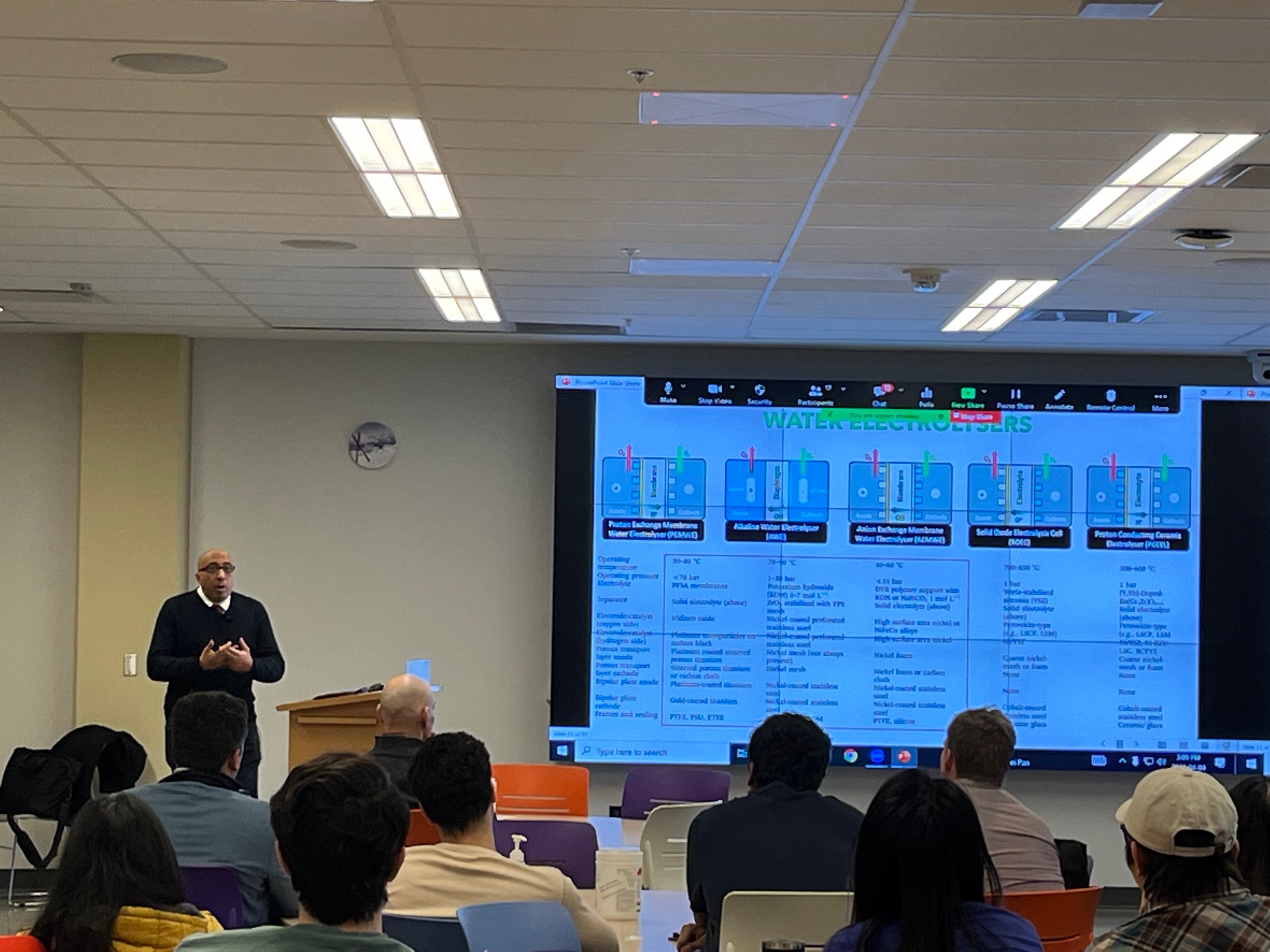 |
|
NSERC CREATE ME2 Materials for Electrochemical Energy Solutions Making It Simple, But Significant: How to Design an Impactful Research Presentation February 28th, 2023 9:30 AM – 11:30 AM The CREATE ME2 team is pleased to invite you to attend this interactive workshop to learn more about designing an engaging research presentation and preparing for participation in the CREATE ME2 Three Minute Thesis Competition. The workshop is delivered by Ms. Felicia Glatz, Learning and Design Specialist, My GradSkills, University of Calgary. As a CREATE ME2 trainee, you are encouraged to participate in the CREATE ME2 Three-Minutes Thesis competition and the competition at your university (Calgary, Edmonton, Waterloo). This workshop targets graduate students (MSc & PhD) to help them develop skills in translating their research and its impact for non-specialists. The skills are becoming essential for many purposes such as https://grad.ucalgary.ca/my-gradskills/three-minute-thesis:
Workshop topics include:
Attendees will have time to apply their learning through exercises such as analysis of 3 Minute Thesis presentations and crafting an outline of their talks using the COMPASS Message Box https://www.compassscicomm.org/ The 3MT takes place each year during the winter term. The CREATE ME2 competition will be held on May 2nd, 2023 and the top three winners will receive a prize of $350, $250, $150 respectively. In addition, $100 prize for the People’s Choice. More details about the competition will be sent out after the workshop. |
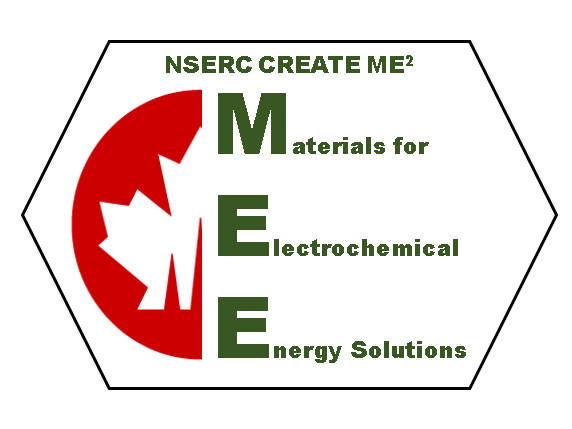 |
|
|
|
|
Description: In this workshop, trainees will learn how to use LCA tools and apply them to assess new technologies under development. Considerations about harmonizing TEA with LCA will be provided to explore potential trade- offs. The workshop will include examples in the energy conversion space, such as using Solid Oxide Electrolysis Cells (SOECs) to produce alternative fuels. During the workshop, attendees will be able to brainstorm how to apply LCA and TEA in their research and get hands-on experience with LCA and TEA to inform R&D decisions through economic and The workshop will be delivered by Dr. Joule Bergerson (CREATE ME2 Co-PI and Associate Professor in the Department of Chemical & Petroleum Engineering) and Emily Nishikawa (CREATE ME2 PhD student). Emily has attended workshops on this theme before and uses these tools extensively in her research, and will provide advice, feedback, and support to trainees. An informal networking event including drinks and snacks will follow the workshop from 17:00 –18:00. Kindly RSVP and confirm dietary restrictions by contacting Fei Pan This email address is being protected from spambots. You need JavaScript enabled to view it. at your earliest convenience and no later than November 7, 2022. We look forward to seeing you at the event. Dr. Joule Bergerson Dr. Joule Bergerson is an Associate Professor in the Chemical and Petroleum Engineering Department and the Centre for Environmental Engineering Research and Education in the Schulich School of Engineering at the University of Calgary. Her primary research interests are systems-level analysis for policy and decision making of energy system investment and management. The focus of her work is developing tools and frameworks for the assessment of prospective technology
Emily Nishikawa Emily Nishikawa is a PhD candidate in Dr. Joule Bergerson’s group in the Chemical and Petroleum Engineering Department in the Schulich School of Engineering at the University of Calgary. She assesses carbon conversion technologies in early stages of development from life cycle and techno-economic perspectives. Electrochemical and thermochemical pathways are of particular interest, as well as biomass alternative fuel production. Previously, she worked with biosorption of toxic metals for wastewater treatment and R&D of consumer products. |
 |
|
NSERC CREATE ME2 Materials for Electrochemical Energy Solutions CREATE and Use Hydrogen
CREATE and Use Hydrogen Conference August 25, 2022 Renewable energy is already operating at scale and is on track to double its reach in Canada. Large-scale energy storage options are critical to address the intermittent and seasonal nature of renewable energy, and enable further deployment into the electrical grid. Hydrogen production and storage can enable grid-scale energy storage in the form of a chemical fuel. Its energy can then be released again by using the gas as fuel in a combustion engine or a fuel cell. The interest in hydrogen energy storage is growing due to the much higher storage capacity compared to batteries (small scale) or pumped hydro (large scale). Hydrogen (H2) will also be an important part of the energy transition as a potential CO2-free fuel source for transportation and industrial processes. We are pleased to invite you to join our fourth CREATE ME2 annual conference and share our thoughts and exchange ideas on how hydrogen can be produced efficiently and used as an energy carrier to store, move, and deliver energy produced from other sources to fulfill this dispatchable energy role and deliver low-carbon energy, explore current and future research directions, and reach new heights on how to CREATE and Use Hydrogen. This conference will focus on the top topics of H2 from fundamentals to applications. It will explain the steps that have led to improved usage of H2 for energy storage and environmental technologies. It will also highlight the speakers experience and findings in the following areas: · Hydrogen Economics · Production and distribution · Energy storage · Hydrogen for transportation · Hydrogen on the road The conference will conclude with a panel discussion on possible H2 sources, the use of hydrogen and barriers to further development. Conference Program Materials, Energy, & Environmental Technology MEET the Innovators! Innovation Fair – August 26, 2022 We are pleased to invite you to join our fourth CREATE ME2 annual Innovation Fair Materials, Energy, & Environmental Technology and meet the Innovators and discover what the faculties of Engineering and Science have to offer This is an ideal industry platform for researchers to showcase their latest research and innovations in clean-energy technology from the CREATE team and our partners, and graduate students and postdoctoral follows in Engineering and Science. The Innovation Fair seeks to present novel research applications and technologies and bring together leading academic scientists, researchers and industry partners to exchange and share their experiences about all aspects of clean and renewable energy. The Innovation Fair is an exciting opportunity for industry, investors and researchers to learn about the latest emerging innovations in sustainable energy technologies. Researchers will display their technologies and promote their commercial potential. Innovation Fair Program |
 |
|
Making It Simple, But Significant: How to Design an Impactful Research Presentation March 2, 2022 We are pleased to invite you to attend this interactive workshop to learn more about designing an engaging research presentation and preparing for participation in the CREATE ME2 Three Minute Thesis Competition. The workshop is delivered by Ms. Felicia Glatz, Learning and Design Specialist, My GradSkills, University of Calgary.
Workshop topics include: Attendees will have time to apply their learning through exercises such as analysis of 3 Minute Thesis presentations and crafting an outline of their talks using the COMPASS Message Box https://www.compassscicomm.org/ The CREATE ME2 competition will be held on April 27th, 2022 and the top three winners will receive a prize of $350, $250, $150 respectively. In addition, $100 prize for the People’s Choice. More details about the competition will be sent out after the workshop
|
 |
|
Solid Electrolytes for All-Solid-State Batteries Workshop January 27, 2022 10:00AM-12:00PM (MST) This workshop focused on Solid Electrolytes for All-Solid-State Batteries and delivered by the keynote speaker Dr. Linda Nazar, University of Waterloo, Department of Chemistry. This workshop included a presentation from the CREATE ME2 trainees, Dr. Chengtian Zhou and Akhil Abraham All solid-state lithium-ion batteries (ASSBs) have emerged as attractive alternatives to conventional liquid electrolyte cells for electrochemical energy storage, owing to their anticipated enhanced safety and higher energy densities. ASSBs are founded on high performance fast-ion conducting solid electrolytes, where the search for improved materials hinges on understanding their intrinsic nature and gaining comprehensive knowledge of the factors that dictate facile Li-ion transport. In turn, incorporating them into high functional ASSBs relies on mastering the interface of the solid electrolyte with the electrode materials. These topics were the focus of the presentation based on recent findings in our laboratory. Our correlation of structure with ionic conductivity in a range of newly developed fast ion Li conductors helps understand how cation disorder and a frustrated energy landscape impacts conductivity and activation energy. These considerations lead to exciting new classes of fast-ion conductors. Promising all solid-state Li-ion batteries utilize “bare” NCM-type, Ni-rich lithium metal oxide cathodes coupled with high voltage-stable solid-state electrolytes. Low-resistance “clean” solid-solid interfaces enable room temperature cells with capacities close to their liquid Li-ion counterparts at practical discharge rates over hundreds and even thousands of cycles.
|
 |
|
Electrochemical Conversion of CO2 to Green Fuels and Products Conference
|
 |
|
Properties of Carbon Materials in Electrochemistry Webinar November 16th, 2021 This CREATE ME2 webinar was delivered by Professor Robert Dryfe, Professor of Physical Chemistry at the University of Manchester, UK, on Properties of carbon materials in Electrochemistry. • Graphene materials Prof. Dryfe concluded his talk by answering the audience questions. |
 |
|
Modern Lithium-Ion Batteries: August 26th, 2021 |
 |
|
ENCH 619.80 MATERIALS CHARACTERIZATION May 5 - June 17, 2021 Monday/Wednesday The course covered a series of different materials characterization techniques. For each technique, there was on-line classes covering the principle of the method, how it works, how it can be used, and the type of information it can generate, and method demonstration (on-line) including video or live demonstration sample preparation, instrument operation, operating software and data analysis. |
 |
|
Career Development Series (four sessions) May 4 -25, 2021 1-3 PM MST (8 hours total) Week 1: How to plan and map your career - May 4, 2021 |
 |
|
Three Minutes Thesis Competition April 29th, 2021 This competition is a great opportunity for graduate students to practice public speaking and present their research to not only academics and scientists but also to the wider community and a general audience. The top three winners will receive a prize of $350, $250, $150 respectively. |
 |
|
Industry Internship / Accelerate Program workshop March 9th, 2021 Do you want to put your talent to work with a paid internship at an organization that needs your expertise? |
 |
|
Making It Simple, But Significant: How To Design An Impactful Research Presentation February 17th, 2021 |
 |
|
The Future of Alberta / Canada Energy Storage and Economic Recovery November 18th, 2020 |
 |
|
Strategies for Finding A Job After Grad School August 18th, 2020 Panellists: Anne Benneker, Erin Gawron, Erwan Bertin, Farbod Sharif, John Vandersleen |
 |
|
Pore-scale Modeling of Battery and Fuel Cell Performance Webinar July 29th , 2020 |
 |
|
Electrochemical Cell Design for Energy and Environmental Applications Webinar June 30th, 2020 10:00 - 11:00MST This was the first joint webinar between the NSERC CREATE ME2 and Waterloo Electrochemical Student Chapter (WatECS). The webinar created to discuss cell design from an electrochemical engineering aspect focusing on the redox flow battery technology for energy storage and the electrochemical water treatment for environmental applications. This webinar was delivered by Dr. Edward (Ted) Roberts, Professor and Associate Head (Research), Department of Chemical and Petroleum Engineering, Schulich School of engineering at The University of Calgary. Dr. Roberts introduced his research in the area of redox flow batteries for energy storage and water treatment technologies. The presentation outlined a general approach for electrochemical cell design (including the bipolar stack, and the integration of porous electrodes), and introduced case studies for both water treatment and energy storage systems. Those case studies reflect Dr. Roberts’ experience in electrochemical technology development, including adsorption / electrochemical regeneration, electrocoagulation, and redox flow batteries. Dr. Roberts highlighted cell design and scale-up challenges arising from flow/mass transport and electrical potential distribution. He also introduced some innovative ideas for cell design for water treatment that were discovered and tested by his research groups, using: moving packed bed, oscillating, and flow through electrodes, as well as magnetic field effects. Dr. Roberts concluded his presentation by introducing the use of flow through electrodes to develop membrane free redox flow batteries and enhance performance in zinc electrode system. |
 |
|
Research integrity and academic writing from proposals to publication at the graduate level May 27th, 2020 10am - 12pm (Virtual Training) University of Calgary This event was our first join event with the Student Success Centre. The workshop was designed to increase students’ awareness of research integrity issues and to present writing strategies to help with developing their research proposal and future publications. The pursuit of knowledge in an academic setting requires an atmosphere of trust. Yet, examples of data falsification and fabrication continue to exist. In this session, we talked about what ethical scholarship means during research, writing and publishing your work. Academic writing is important for graduate students, especially in a research institution like the University of Calgary. At the beginning of the graduate program, supervisors expect graduate students to write an acceptable research proposal and be able to articulate an effective thesis statement to describe their research. This task would prepare the stage for graduate students to write a comprehensive research abstract and prepare them to participate in a conference and write journal publications. Academic writing is not an easy task. Writing is a process. You write to convey your ideas, knowledge and your research findings to an audience, not just to yourself. The writing section of this workshop focused on how to improve students' writing skills. It started with common challenges that graduate students experience in their writing. Then, it proposed an effective approach to help students nail down their specific research objective and build an effective thesis/dissertation structure. The workshop delivered by Ms. Lee-Ann Penaluna and Mr. Alaa D.A. Dabboor from the Student Success Centre at the University of Calgary. |
 |
|
Introduction to Neutron Reflectometry for Electrochemical Applications March 25th, 2020 - Virtual Training University of Calgary 09:00 – 13:00 The workshop delivered by one of our postdoctoral fellows, Dr. Udit Shrivastava. This workshop introduced researchers to Neutron Reflectometry (NR) and its application to study interfacial structures encountered in many electrochemical systems. One of the pertinent examples is the electrochemical interface in polymer electrolyte based electrochemical devices, i.e. the catalyst/ionomer interface encountered in fuel cells, gas-fed CO2 electrolyzers, water electrolyzers, and polymer-electrolyte based sensors. NR is a depth profiling technique often utilized to provide information on the material distribution down to few Angstroms in the thickness direction of ultrathin films (~5 nm) and thick films (~ 100 nm). In addition, NR is employed to measure the swelling of thin films under external stimulus such as metal hydride expansion upon absorption of hydrogen. Pertinent to the electrochemistry, NR is one of the few techniques which has been exploited most to study the adsorption and the generation of an entity on the electrochemical surfaces in a non-electrochemical environment or in an in-operando electrochemical cell. Thanks to the non-destructive nature of neutron-material interactions virtually any material can be studied using this technique. The workshop introduced principle and application of NR to the electrochemical systems. |
 |
|
Hands-On Introduction to the Analysis of X-Ray Photoelectron Spectroscopy Spectra using CASA XPS February 18th, 2020 This was the first 2020 technical workshop delivered by one of our former postdoctoral trainees and now assistant professor of chemistry at St Francis Xavier University, Dr. Erwan Bertin. This workshop provided an introduction to the analysis of electrocatalysts (or any other materials for which knowledge of the surface is of the uttermost importance) by X-Ray Photoelectron Spectroscopy (XPS), specifically focusing on the interpretation of the results using Casa XPS. Even though electrochemical techniques are the most surface sensitive technique available to researchers, they must be combined with another technique to get specific information regarding the oxidation state, eventual electronic effect or the composition of a surface. Unfortunately, very few techniques are able to probe the surface of a catalyst at a level pertinent to a comparison with electrochemical results. XPS is one of these techniques. This workshop introduced fundamental aspects of XPS analysis such as how to (a) select the information to seek while operating the instrument (or to request if the analysis is done elsewhere), (b) use the software, and (c) analyze the data. The attendees examined the key steps of the analyses: calibration, peak identification, deconvolution and quantification of the surface. Dr. Bertin concluded his presentation by highlighting XPS data in published manuscripts to help attendees read and interpret the results. |
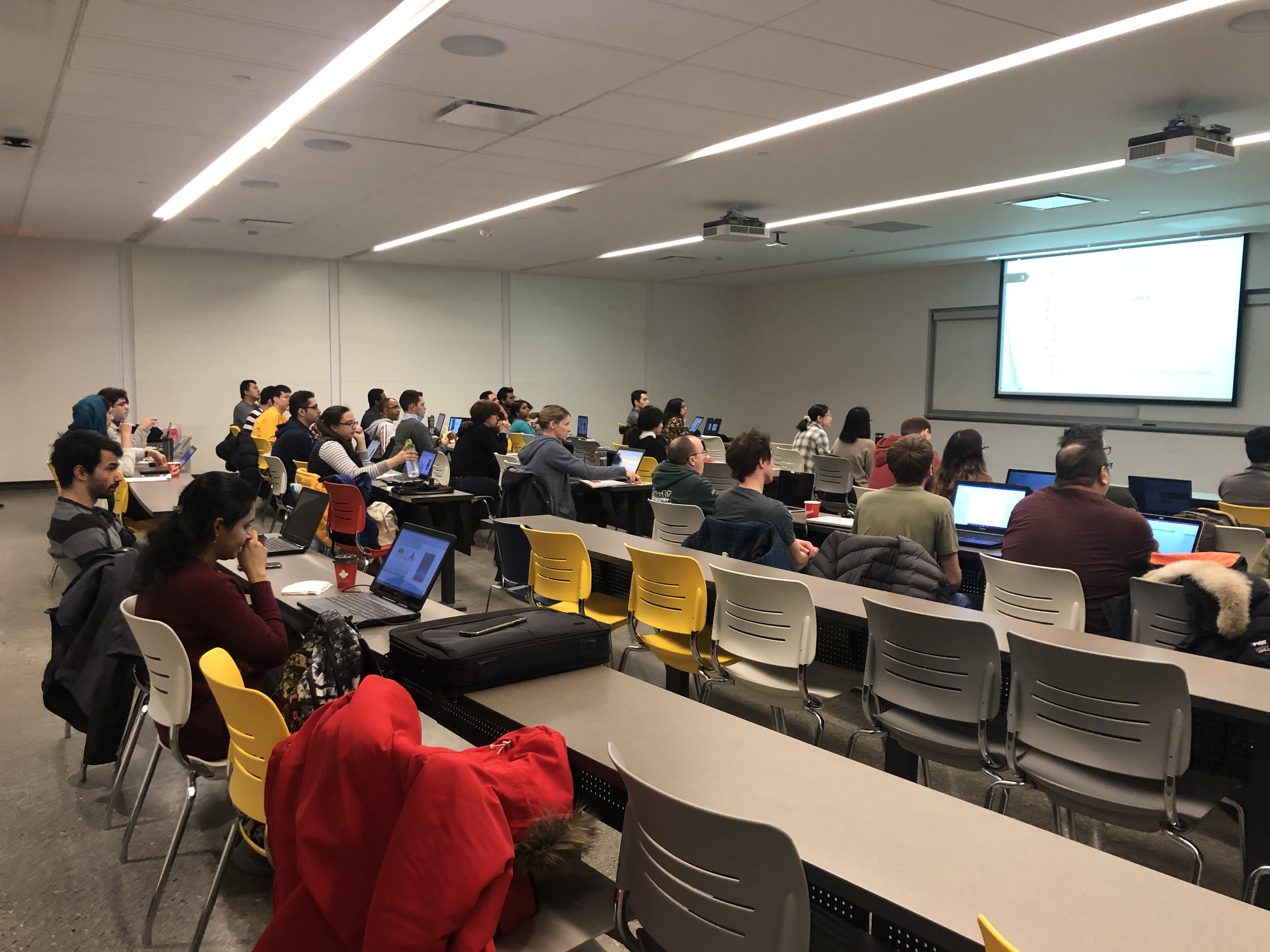 |
|
Making it simple, but significant: How to design an impactful research presentation (3 Minute Thesis) February 3rd, 2020 This interactive workshop aimed at helping trainees learn more about designing an engaging research presentation and preparing for participation in the UCalgary 3 Minute Thesis competition. This workshop targeted graduate students (MSc & PhD) to help them develop skills in translating their research and its impact for non-specialists. The skills are becoming essential for many purposes https://grad.ucalgary.ca/my-gradskills/three-minute-thesis: • Funding proposals Workshop topics included: |
 |
|
Invention & Innovation in University Research November 26th, 2019 This workshop discussed how inventions can be protected and the initial steps of commercialization of ideas developed in the University research lab. The workshop was held at the University of Calgary on November 26th, 2019 from 09:00 – 15:30 |
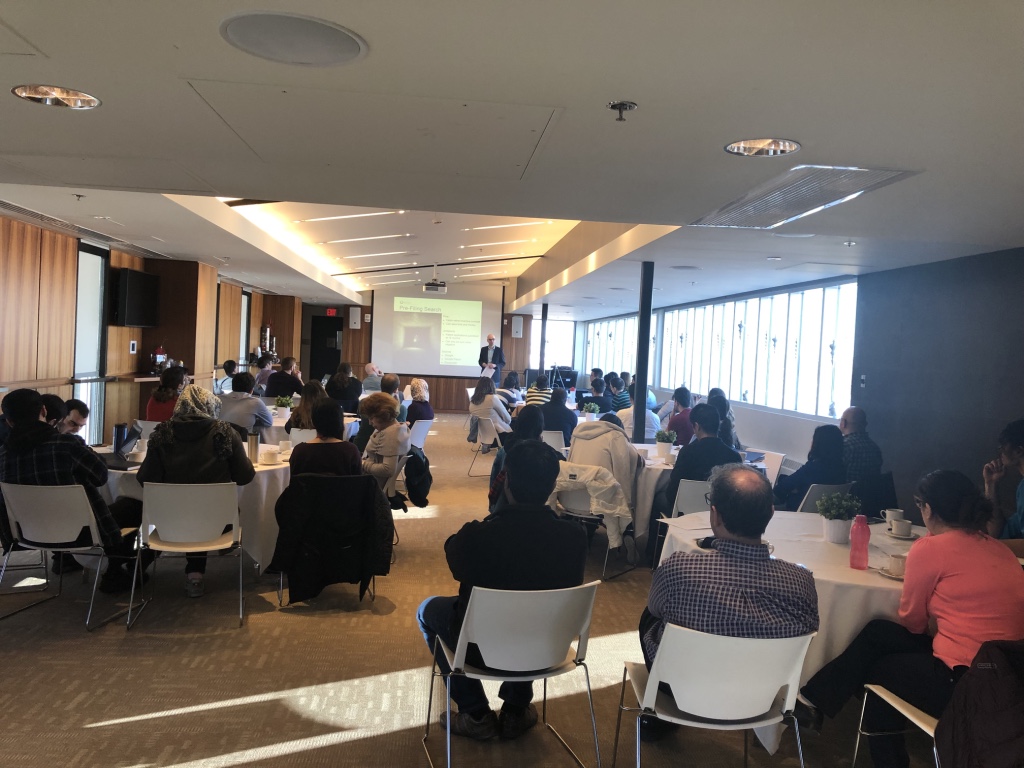 |
|
NSERC CREATE ME2 Program in Materials for Electrochemical Energy Solutions EMERGING TECHNOLOGIES FOR SUSTAINABLE ENERGY SOLUTIONS ANNUAL CONFERENCE 2019 August 29-30, 2019
KEYNOTE SPEAKERS: |
 |
|
From an Early Concept to a Viable Product Workshop The NSERC CREATE ME2 Materials for Electrochemical Energy Solutions & the Hunter Hub for Entrepreneurial Thinking July 2nd, 2019 08:30 – 16:30. |
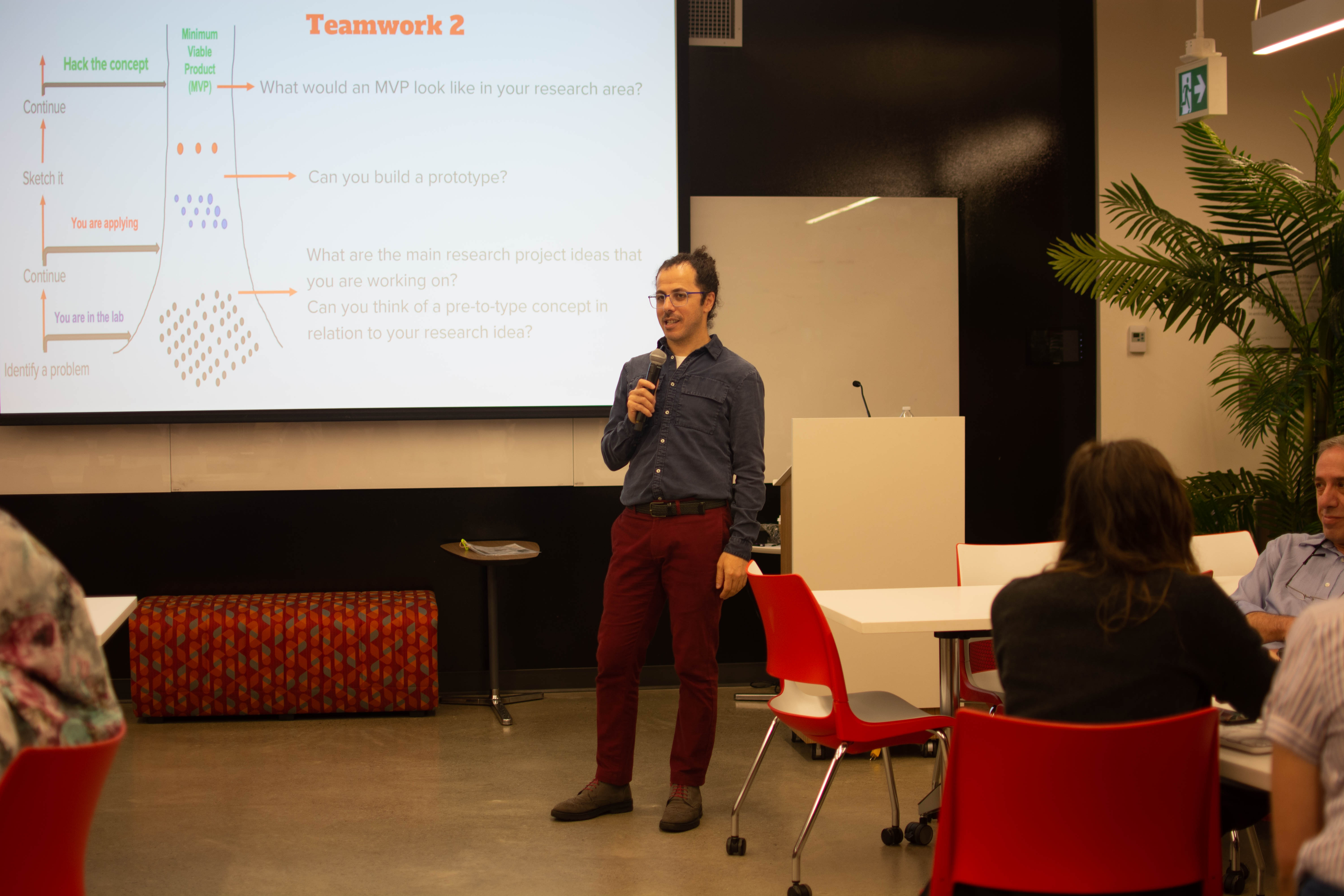 |
|
Sustainability and Techno-Economics Workshop Series May 23, May 30, June 6, & June 13, 2019 |
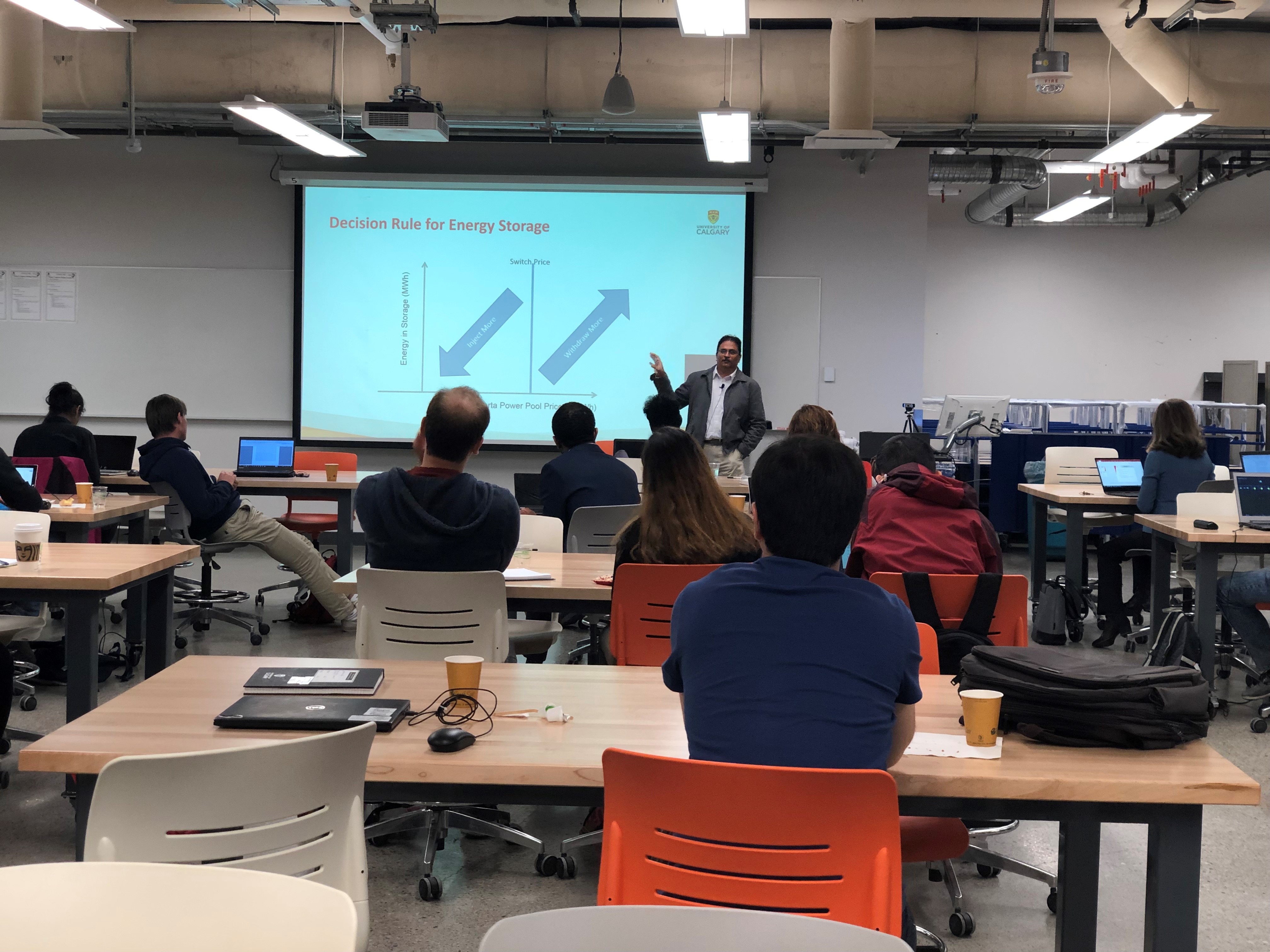 |
|
An introduction to Continuum-based Multi-scale Fuel Cell Modeling Using OpenFCST April 11th, 2019 This is the first Modeling workshop delivered by one of our Principal Investigator, Dr. Marc Secanell Gallart. He provided an introduction to continuum-based multi-scale fuel cell modeling using the open-source fuel cell simulation toolbox (OpenFCST), available for download. The morning session focused on some fundamentals on the theory of mass and charge transport, electrochemical reactions, and numerical modeling techniques. The afternoon session included two hands-on demonstrations on how to use OpenFCST to study transport in a fuel cell electrode and on a catalyst layer micro-structure. Dr. Secanell concluded his presentation by answering questions and providing research recommendations and best practices. |
 |
|
Practical Introduction to Electrochemistry ansd Oxygen Reduction Reaction Measurement March 7th, 2019 This workshop was our first workshop series delivered by one of our Postdoctoral Fellows, Dr. Erwan Bertin. The workshop was dedicated to provide a quick introduction to applied electrochemistry, with a focus on rotation disk electrode (RDE) measurements for oxygen reduction reaction. It included some fundamentals basis, a presentation of common electrochemical techniques (OCP, CV, CA, RDE) and their key elements. Following these more theoretical aspects, the presentation transition toward how to perform actual measurements. Various methods for the determination of the electrochemical surface area were covered, as this is of the uttermost importance to publish meaningful results. Dr. Bertin concluded his presentation by explaining the proper preparation of the setup (glassware, choice of reactants, preparation of electrodes). |
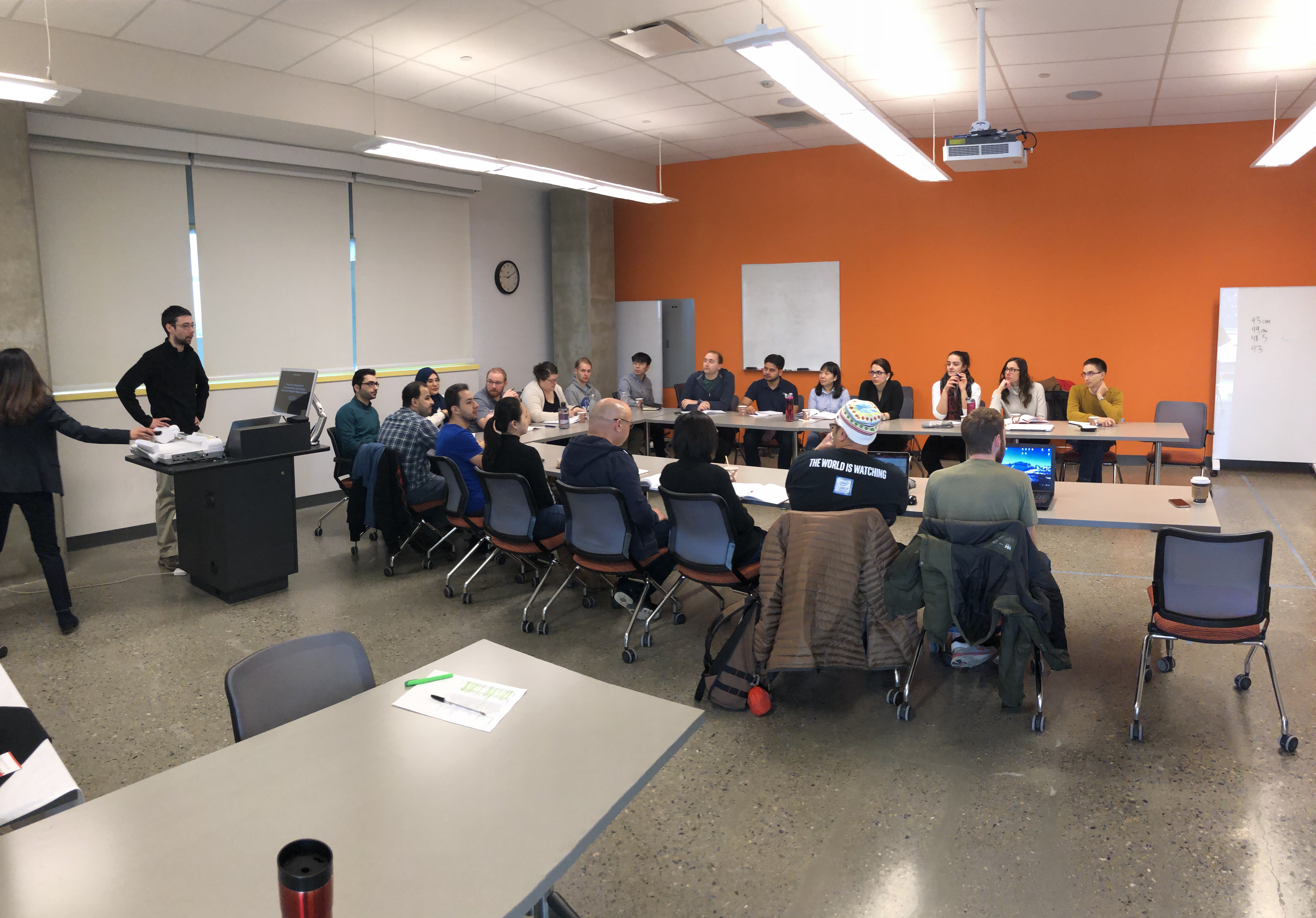 |
|
Protecting Your Ideas Invention & Innovation in University Research December 12th , 2018
These topics were presented in the context of the CREATE themes of ‘Materials for Electrochemical Energy Solutions”, with relevant examples. |
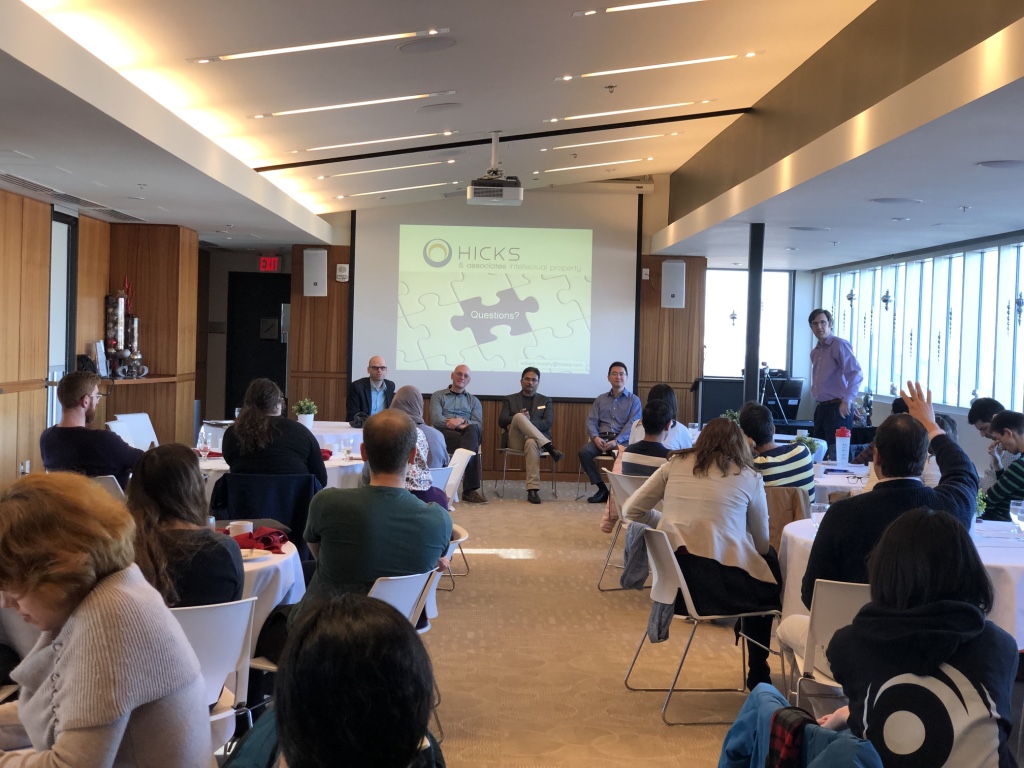 |
|
Analytical Techniques Workshop November 13, 2018 |
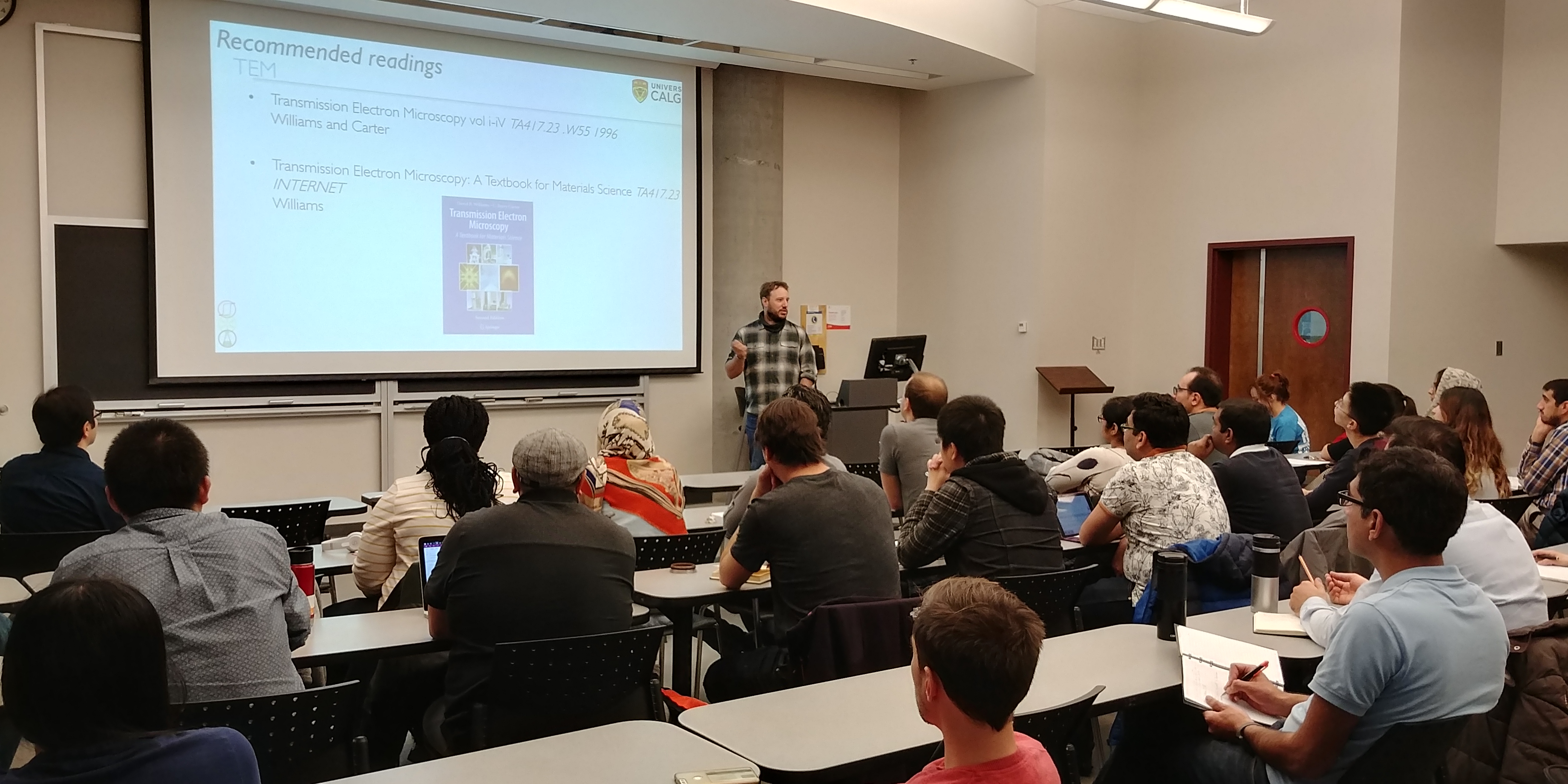 |
|
Energy Conversion and Storage Technologies NSERC CREATE ME2 Materials for Electrochemical Energy Solutions 2018 Annual Meeting
|
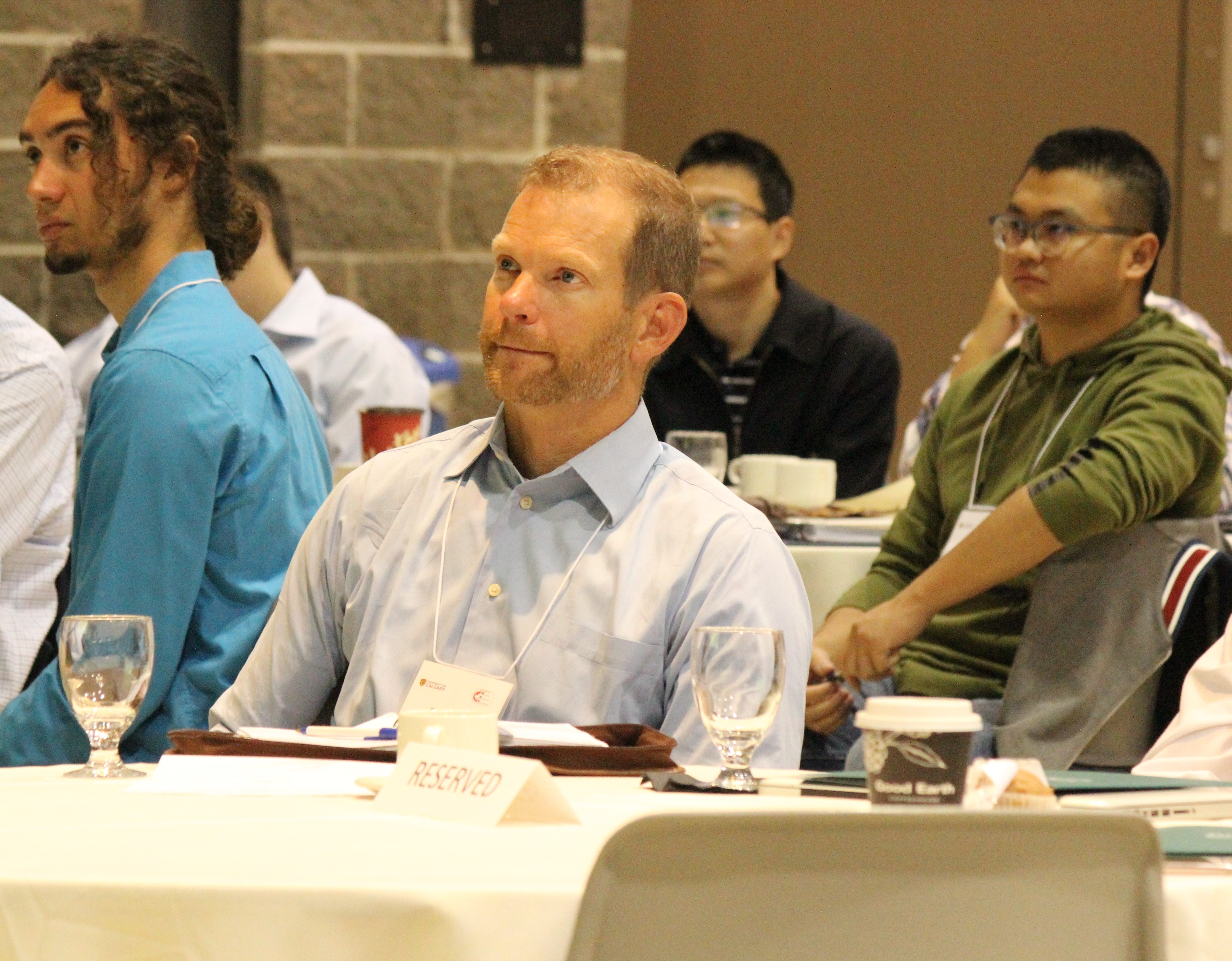 |
|
Environmental Sustainability and Life Cycle Analysis August 22, 2018 The workshop included introductory presentations and discussion of sustainability and life cycle analysis (LCA) in the context of energy storage and conversion. The environmental impacts and trade-offs are typically uncharacterized until the technology is close to commercialization. This can lead to unintended negative economic and environmental consequences when a new technology is deployed. The workshop particularly focused on an electrochemical energy conversion such as Materials for Solid Oxide Electrolysis Cells (SOECs) pathway. |
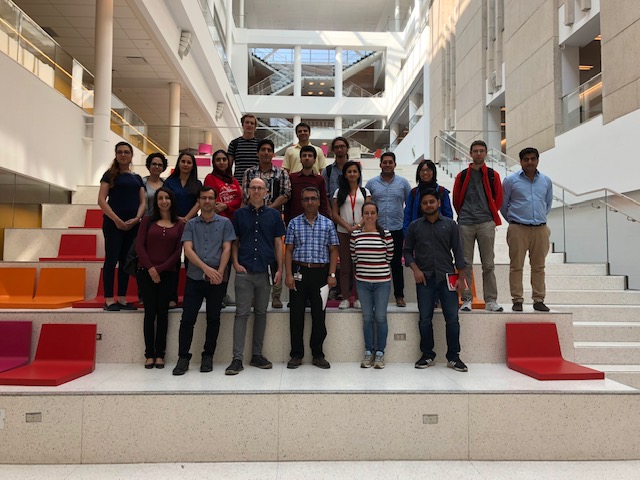 |
|
Transformative Talent Internship Session July 18, 2018 The session offered an introductory to Transformative Talent Internship Program organized by the Faculty of Graduate Studies at the University of Calgary. This Program benefits ONLY graduate students at the University of Calgary and the University of Alberta. The session reviewed Transformative Talent Internship eligibility, the application process and available funding plus Q&A. Natalie Wilkinson-Houghton – Business Development Specialist Graduate Student Internships\Faculty of Graduate Studies, presented this session and explained how they could grad students benefit from it. |
 |
|
Techno-Economics, Technology Transfer and Commercialization Part 2: How to build a minimum viable product (MVP) & create a company May 9, 2018 The workshop provided what constitutes a minimum viable product (MVP), the steps toward building a file-ready prototype, and the components involved in creating a company. The workshop was presented by Peter Zyla from Innovate Calgary. |
 |
|
Techno-Economics, Technology Transfer and Commercialization Part 1: How to determine the commercial potential of inventions April 25, 2018 The workshop focused on determining the commercial viability of inventions and ideas using the StrategyzerTM concepts. It also provided an overall view of the economic and regulatory environment of the energy industry. The workshop was presented by Peter Zyla from Innovate Calgary and Mokhtar Tabri, a PhD candidate at the University of Calgary in the Department of Economics. |
 |
|
Applications of 3D Confocal Raman Microscopy and Correlative Techniques Workshop April 18, 2018 The workshop introduced applications of 3D confocal raman and correlative techniques, including AFM, SEM and SNOM. Also, it presented a new approach for high speed, high lateral and spectral resolution in raman imaging. A live instrument demonstration was provided. was sponsored by WiTec Corporation (Germany) and it partner Spectra Research Corporation (SRC) in Canada. |
 |
|
'One Canada' Electrochemical Energy Storage Research: Redox Flow Batteries Workshop’ February 22, 2018 Alberta Room at the UofC The workshop provided a forum for academic and industrial peers to exchange experiences, best practices, and ideas related to current emerging issues associated to this emerging energy storage technology. Also, shared knowledge of status, new directions, and challenges of redox flow battery (RFB) technology. Share knowledge of status, new directions, advantages, and challenges of redox flow battery (RFB) technology, |
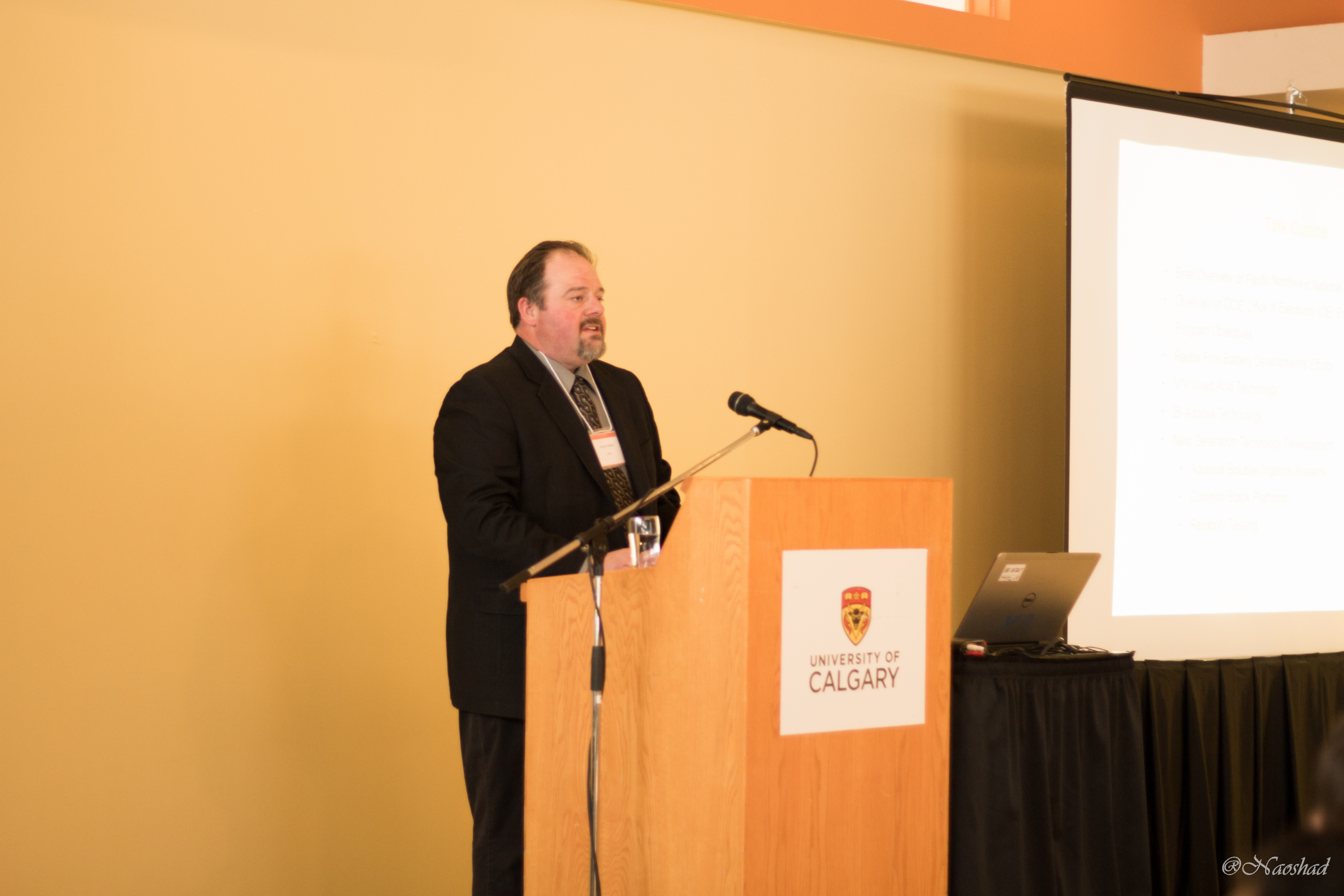 |


